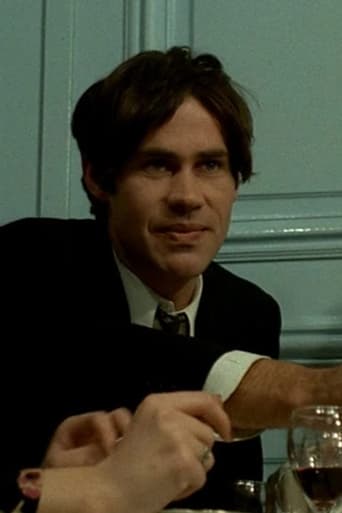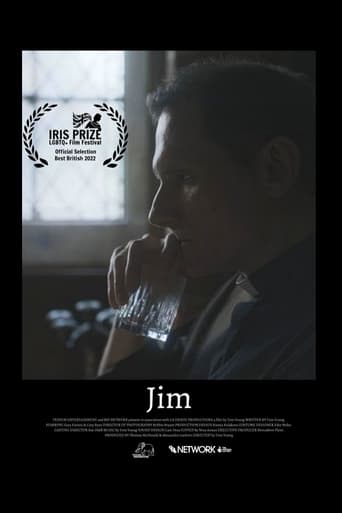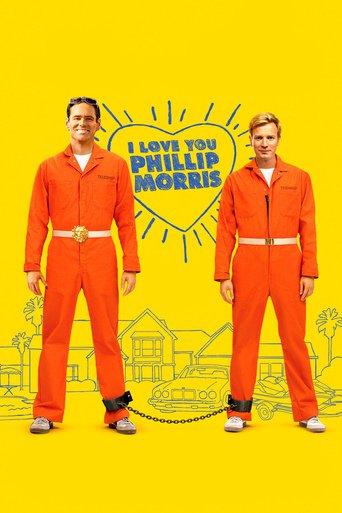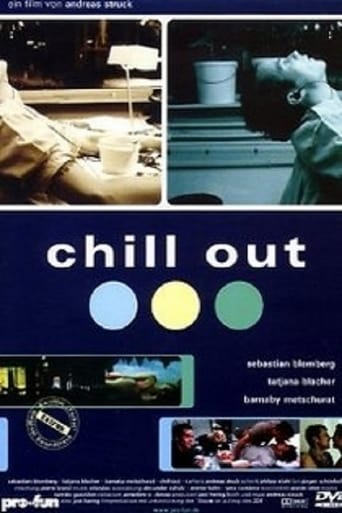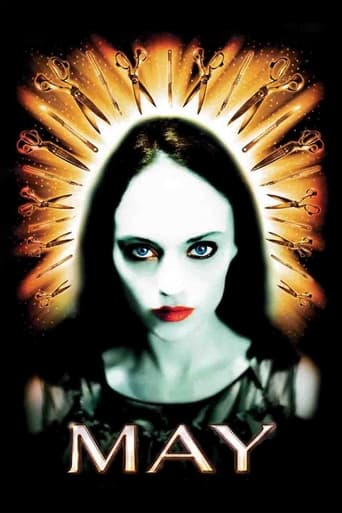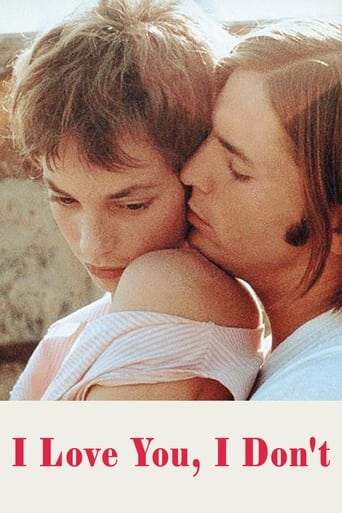
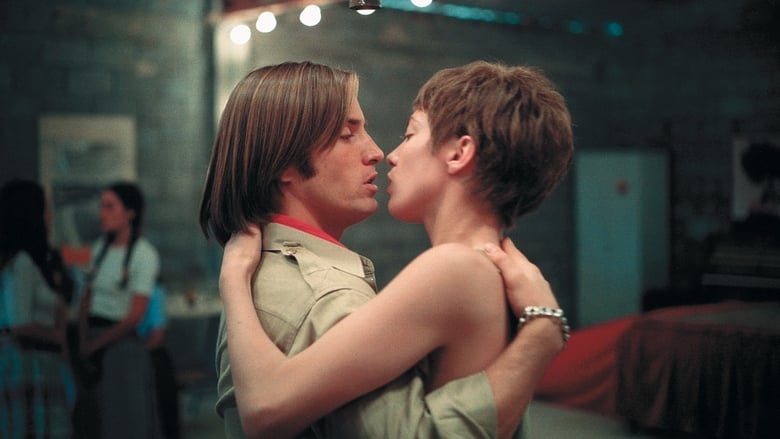
I Love You, I Don't (1976)
The petite waitress Johnny works and lives in a truck-stop, where she's lonely and longs for love. She develops a crush on the garbage truck driver Krassky, although her sleazy boss Boris warns her that he's gay.
Watch Trailer
Cast
Similar titles
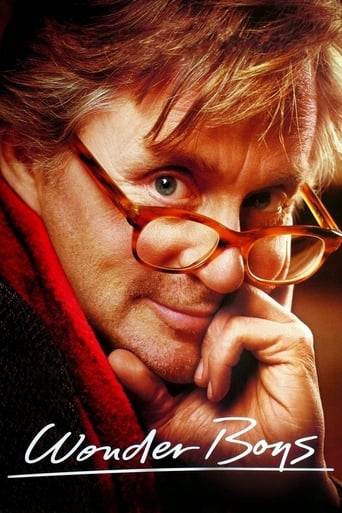
Reviews
Sick Product of a Sick System
A Masterpiece!
Entertaining from beginning to end, it maintains the spirit of the franchise while establishing it's own seal with a fun cast
Like the great film, it's made with a great deal of visible affection both in front of and behind the camera.
The story line was intriguing but the film could have been so much better, like with a better script, better actors, better direction etc. Apart from the 'Je T'aime' song, the music in this film is particularly inappropriate. When I think of Joe Dallesandro the word 'wooden' comes to mind, and the others taking part are on a similar level, although Jane Birkin should get a mention for effort. Nothing much happens apart from the garbage truck driver attempting anal sex with the waitress. The question remains, did they finally achieve this satisfactorily in the back of the truck, or had he inadvertently managed to find the right hole? I don't suppose I'll ever know.
The homosexual garbage truck driver Krassky (Joe Dallesandro) and his partner Padovan (Hugues Quester) stop at an isolated restaurant near the landfill where they work to drink a beer. They are served by the waitress Johnny (Jane Birkin) and she explains that the sleazy owner Boris (Reinhard Kolldehoff) has given that nickname to her since she wears short hair and has small breasts. Her tomboy style attracts Krassky and she has a crush on him. Boris warns her that Krassky is gay but Johnny dates him. When they go to bed, Krassky fails; however, when he sees her laying down on her face, he gets excited and sodomizes her. They start an unusual relationship while Padovan gets jealous. "Je t'aime moi non plus" is a cult perverted romance that called the attention of Jane Birkin to the audiences in the 70's. This actress is used and abused along the shallow story and made the title song famous mainly because of her moaning and screams. This song has also become a synonym of love and eroticism. My vote is five.Title (Brazil): "Paixão Selvagem" ("Wild Passion")
Not much of a story, like in "un homme, une femme"(also with a famous song in the film) , its real strength is the atmosphere it invokes, - the desolute landscape which accentuates the feeling of loneliness, the truculent male star, the hard stares from the judging locals, the weak and fragmented dialogue, the not too bright couple who were madly in love, it's just one of those films that you can't forget, and of course, very french in style, ....the scenes of anal sex were unnecessary, but the film was released in the 1970's so a bit of scandal , only helped to sell more the film to the public.I think a remake of this film in the US, could be done nowadays. Filmed in the plains of the Midwest, in some god forgotten village, it would be a hit, especially considering the amount of free publicity US films get !
I won't rate this movie, because it makes an impression despite being unimpressive on the whole. Often boring and disgusting, this movie can still stand to viewing given two academic crutches: its boringness supported by Brecht's warning that boring stories can be more thought provoking and its disgusting portrayals of sex held up by Paul De Man's proviso that disgust is a distraction from the larger picture.The dialog has some merit. As in My Life to Live or Alphaville or Pulp Fiction for that matter, moments where the film has made you feel most alienated from the characters usually foray into uncommon, abstract conversations. The answer to "Johnny" (Jane Birkin) when she tells her boyfriend, "I love you. Do you love me?" is not "I don't" but rather an unenthusiastic, somewhat incomplete "yes." He explains that the way their bodies move in rhythm together is all love is, and that it's rare.The scenes that will appeal to fans of French film are the ones where "Johnny" and her boyfriend are alone and where "Johnny" is not crying in agony. Her lover will utter something strange and surprising like that his work as a garbage man is important because moving things from one place to another is just like what happens to bodies after they die. Enthymemes, incomplete logical statements, abound in that character's statements. In this case, he does not establish the importance of transporting corpses. Later, he explains that sometimes he wishes he were crap, because he used to dream about coal-burning trains and they're electric now. He does not explain whether it's the look or the smell or the wastefulness of burning coal that appeals to him, and why the new technology thus devastates him. At the end of the film, he tells "Johnny" that he would not beat up his old boyfriend who had threatened her life, with less than an explanation: "You want me to make his face into hamburger meat? What would that do?" Indeed, his rejection of her demand leads to his devastating inaction and their climactic fight.Serge's choice of such an unappealing gay protagonist makes this film feel homophobic. The mental inadequacies of the character do not stop at frail logic. His attempts to fool himself that "Johnny" is a boy make him seem as delusional as Scottie in "Vertigo," when Scottie dresses up a hat shop clerk named Judy Barton as a dead woman named Madeleine. His tolerance for "Johnny's" pain during anal intercourse paints him as an introverted and apathetic jerk a la Humbert Humbert. His flight from an angry woman makes him seem like any other craven character in a romance.Characters and plot are not everything in a movie. The camera work is original and the songs are inspired, but FEW (just three songs!)! Why couldn't such a prolific musical mind at least work with leitmotifs within his three melodies? Some of the decay of Serge's ambition is e


